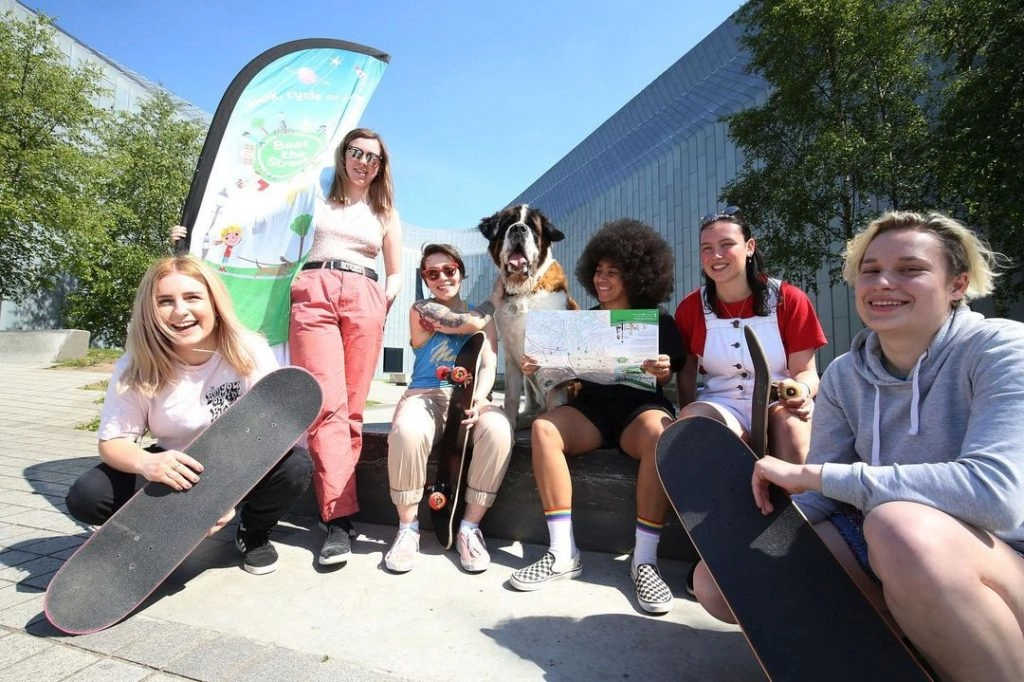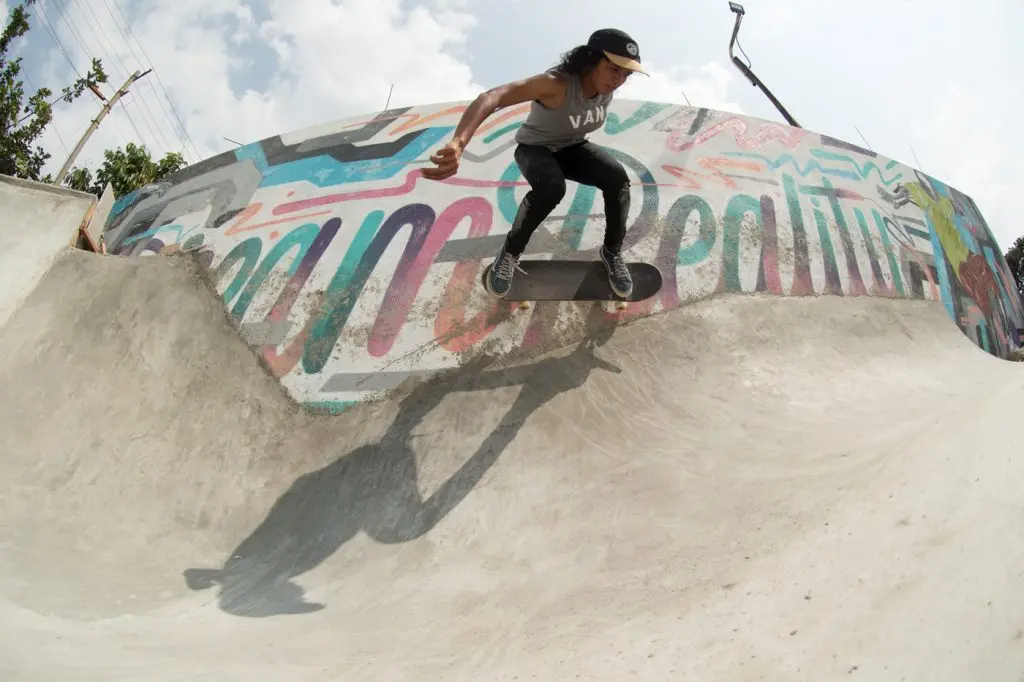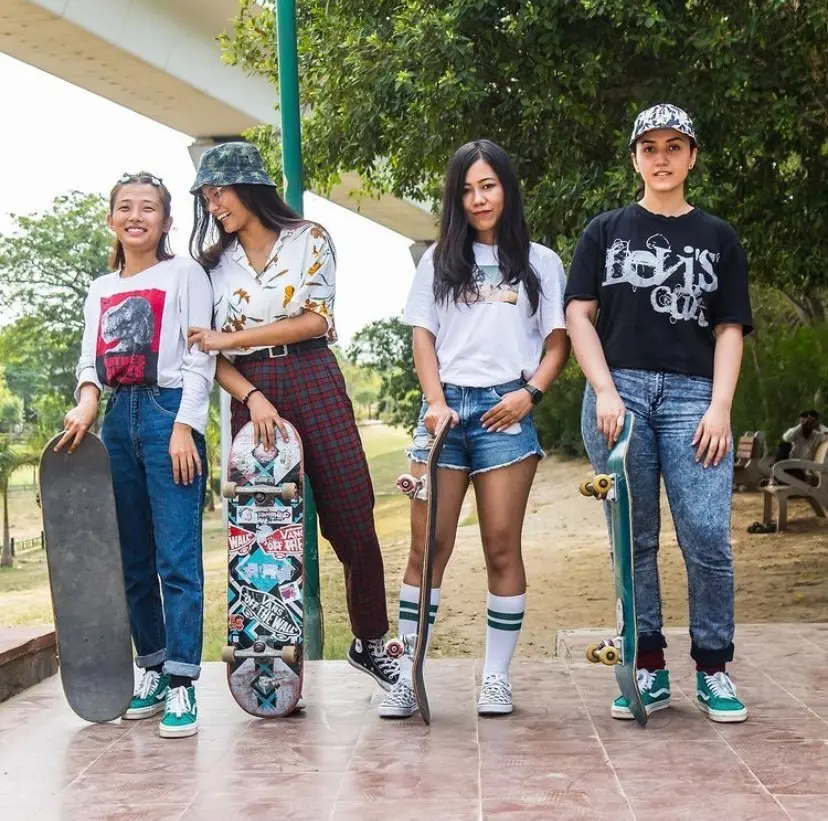Article by Sarah Deiss
Skateboarding is a celebration of not following the norms, rules or authority and that should be applied within skateboarding media and organizations as well. Different outlets for skateboarding matter to the community, because not all skateboarding is the same, nor it should it be. Rachel Campbell and many more have taken it upon themselves to change how we gather in skateboarding.
Like many women in skateboarding, Rachel Campbell, who runs Skateburds in Glasgow, Scotland has been quizzed about her true interest in skateboarding. “Can you skate? Can you do this trick? Why do you hang out with all these guys?” Rachel replies from her own experience, “Well, it’s not really why it’s the one female that hangs out with these guys skaters– it’s more why do I not see more girl skateboarders?”
In the last decade or so, skate collectives, communities and companies have been popping up all over the world for the less represented skaters. Skateburds is one of them, and Rachel has been running it since 2018.
Rachel discusses the difference between some girls’ journey into the skate scene compared to boys. Documentaries or articles often touch on how skateboarding impacted famous male skateboarders’ lives, going down a hole of obsession the instant they learn how to ollie, and for less represented groups, like girls, do not always fall down that deep love of skating until months or years later into it.
Rachel explains her experience in high school, “There were only two girls I had seen in Glasgow skating and they were quite older than me, and they weren’t treated any differently. But it was like, if you were a girl, or anyone outside the straight male norm, coming into skateboarding you became ‘one of the boys’ rather than it just being a neutral zone for everybody to be themselves.” This was at Kelvingrove, arguably the busiest skatepark in town, but the two girl skateboarders made Rachel feel like progression was really possible, it was skating right in front of her.
“My pals were all guys, and some would not do their schoolwork or patch a class to go skate and it was blamed on their hormones, while I was kept in because all my teachers were on my back constantly saying, ‘you’re acting out like those boys’ and I would be like, well yeah, so why are you on my back because you’re not on theirs?”
Skating for Rachel felt it came with breaking expectations that she feels have been engraved into girls. It does not break easily or without emotional burdens. “My pals were all guys, and some would not do their schoolwork or patch a class to go skate and it was blamed on their hormones, while I was kept in because all my teachers were on my back constantly saying, ‘you’re acting out like those boys’ and I would be like, well yeah, so why are you on my back because you’re not on theirs?”
Rachel admits, “In high school I was constantly fighting with myself deciding whether I should skate or not because when I don’t skate, people want to hang out with me more and don’t find me embarrassing. When I had my skateboard, less people would talk to me, more people would look me up and down.”
Rachel’s feelings lead her to find Doyenne, then through word of mouth, Skateburds at age 16. At 17 Rachel was running it. “I grew up with this mentality that skateboarders are against the world. Because non-skaters were the ones always being pricks, which pushed me more towards skating once I got over fighting with myself if I should skate or not. I realized the ones that were on me about skateboarding were just people who did not accept me, and I have a community of all skateboarders that like me regardless. I can take the idea I want, what I believe will make a stake community better and see what happens. I just wanted everyone who wants to be involved, to be involved in skateboarding. I wanted for people to see the skateboarding community another way.”
After starting Skateburds, Rachel often heard ‘I wish I had someone to skate with,’ or ‘I think I would skate more if I had someone to skate with’ so Rachel wanted Skateburds to be a place for anyone, to make it easier to get into skating without having to worry about what could go wrong, because there is space that will welcome you at any level.
“One of the main things I want to do for the skate scene is to make it more accessible for a wider range of people. No matter what starting something new is scary, and I know that if I were about to start another sport, I would be really anxious. I just want to make it easier for people and have someone who will be understanding to how they feel instead of feeling judged for it. I know at the beginning, it was heavily portrayed that Skateburds is only for women, especially in the name, but I’d like for them to see from the posts and the sessions I run that anyone can come. I didn’t start this wanting ‘more girl skaters, less boys.’ I wanted to teach people beyond girls my age who I wanted to be friends with, I want to teach toddlers, kids, old people, parents, queer people, or people who are anxious to start for whatever reason. Even to have people come sit and speak to people who are into skateboarding can get someone involved.”
“It’s about experiencing the skatepark for yourself and taking up the space you deserve. I don’t want there to be a stigma or stereotype that skateparks are cliquey and unwelcoming."
Taken by Rachel Campbell at the Transport Museum Glasgow
It is not a matter of being better than a skate park, it’s about addressing how a lot of girls who come to Skateburds meet up say, ‘I was too anxious to go to the skatepark’ Rachel tells those people, “It’s about experiencing the skatepark for yourself and taking up the space you deserve. I don’t want there to be a stigma or stereotype that skateparks are cliquey and unwelcoming,” Rachel adds, “because less people will not come to the park. But of course, if there are people being horrible, I want the skate scene to deal with that too.”
Rachel Campbell’s drive to influence to get more people to skate triangulates together, from supporting her community centers teaching skate lessons, organizing inclusive skate sesh’s with Skateburds, to helping the people she meets set up boards at her job, a UK wide skate shop, RouteOne. Rachel carries a welcoming, non-judgemental presence throughout Glasgow, building a larger skate community welcoming anyone interested.






